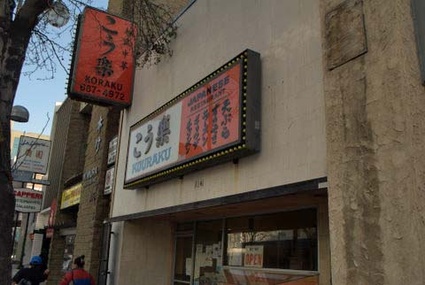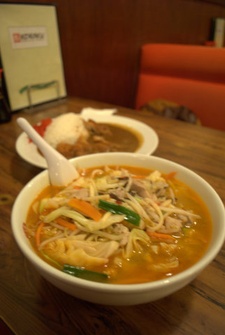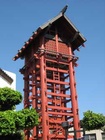Situated on East 2nd St. in Little Tokyo, Koraku Restaurant’s bright orange and white signs, with their bold, black letters and Japanese characters, are difficult to miss. While its first two characters are in hiragana, the last character of the restaurant’s name is the Japanese kanji symbol, which stands for “joy” or “relief”. In Japanese, the word “kouraku” itself means “outing” or “pleasure trip”. With its laid-back atmosphere and friendly staff, not to mention its delicious food, Koraku definitely lives up to the meaning of its name. The restaurant is owned by Hiroshi Yamauchi, a first generation Japanese immigrant to the United States.
Born in Fussa, Tokyo on February 5, 1953, Mr. Yamauchi was surrounded by American culture as he was growing up, a condition that would initially fuel his desire to travel to the States. During World War II, the Japanese army used Tama Airfield, a military base within Fussa, as their main flight test center. In the post-war years of American occupation, however, it was renamed the Yokota Army Airfield. Because of the air force base, Fussa became home to many American GI’s and their families. In fact, Mr. Yamauchi’s next-door neighbors were American.
“My parents encouraged me to play with their children, but [ironically] the kids spoke Japanese well,” he laughed.
Although learning the language didn’t quite work out as his parents had hoped, Mr. Yamauchi’s interactions with his neighbors exposed him to an American lifestyle that he found to be fascinating. The first time he entered an American home, he was amazed by how different it was from his own. He didn’t have to take off his shoes before walking through the front door, the rooms were warmed by central heating, and the kitchen contained a refrigerator. He commented on how nice it felt to be in a warm room, reflecting back on how harsh Japanese winters could be. The refrigerator, however, was the most shocking to Mr. Yamauchi because it contrasted so sharply with the ice-filled room his family used to store food.
“Everything was so interesting and different from Japanese culture,” Mr. Yamauchi recalled.
American music, especially, had a powerful impact on his life because it helped him to learn English. He grew up listening to the Beach Boys, Elvis Presley, and the Beatles, all of which spurred his interest in learning how to play the electric guitar. Not just music, but movies, like Westside Story, and even cars, like the Firebird, also caught Mr. Yamauchi’s attention. Living in Fussa and being constantly surrounded by American cultural influences inspired him to make the decision to immigrate to the U.S. in 1976 when he was just twenty-three years old.
Leaving the life he knew behind, Mr. Yamauchi settled in California, where he stayed with a friend in west L.A. While attending an extension school of UCLA to improve his English, Mr. Yamauchi worked hard to build a new life in a new country. Besides the duties of being a student, Mr. Yamauchi also worked as a waiter in a Chinese restaurant in Santa Monica. He was later employed by the highly acclaimed Yoshimura motorcycle company for three years, running tests on the development and function of various motorcycle parts to improve the speed, efficiency, and power of the company’s motorcycles. After working in a gift shop in Little Tokyo for a short period, Mr. Yamauchi finally settled on the restaurant business. He first became involved with Koraku when his friend asked him to be her business partner in 1986. Over the years, he eventually bought the entire business, and today is Koraku’s sole proprietor.
Under Mr. Yamauchi’s supervision, this humble restaurant has amassed its own unique list of famous clientele, a testament to the authenticity and tastiness of its dishes and the service of its staff. Famous stars from Japan drop by when they’re in L.A., though out of respect for his customers, Mr. Yamauchi prefers to have their names remain anonymous. Hideo Nomo, the Dodger’s pitcher, and Ichiro Suzuki, outfielder for the Mariners, also both come to the restaurant whenever the two teams play each other at Dodger Stadium. Mr. Yamauchi remembers Ichiro once ate lunch at Koraku before hitting a home-run during his evening game.
“Koraku’s food must be special,” he joked. The restaurant is always busy whenever the two teams are in town since baseball fans come to eat after the game finishes.
Whether they’re from Japan or California, Koraku’s reputation in the community definitely seems to be growing. Mr. Yamauchi has come a long way from his humble beginnings as a Japanese student who could hardly speak English. Today, Mr. Yamauchi owns not just Koraku but several other restaurants as well, including ones in Torrance and Primm, Nevada. All serve as proof of his hard work and diligence. Although he originally came to America because of the appeal of its lifestyle and his goal to study English, Mr. Yamauchi never forgot his Japanese roots. Through Koraku’s service of Japanese food, he hopes to continue to bring a small piece of his culture to his customers. No longer in a “new” country, Mr. Yamauchi and his restaurant have earned their place in Little Tokyo’s community, a place that he has come to call home.
Works Cited:
Yamauchi, Hiroshi. (2010, March 5). Personal interview.
* Note: Changes were made to this article at the request of the author on April 27, 2010.
** Discover Nikkei partnered with Professor Morgan Pitelka of Occidental College and his students taking the Spring 2010 seminar “Japanophilia: Orientalism, Nationalism, Transnationalism” on a meaningful community-based documentation project. The students interviewed owners of five long-time Little Tokyo businesses to create Nikkei Albums and articles.
View the Nikkei Album: Koraku Japanese Restaurant 314 East 2nd Street
© 2010 Jacy Yoshimoto





